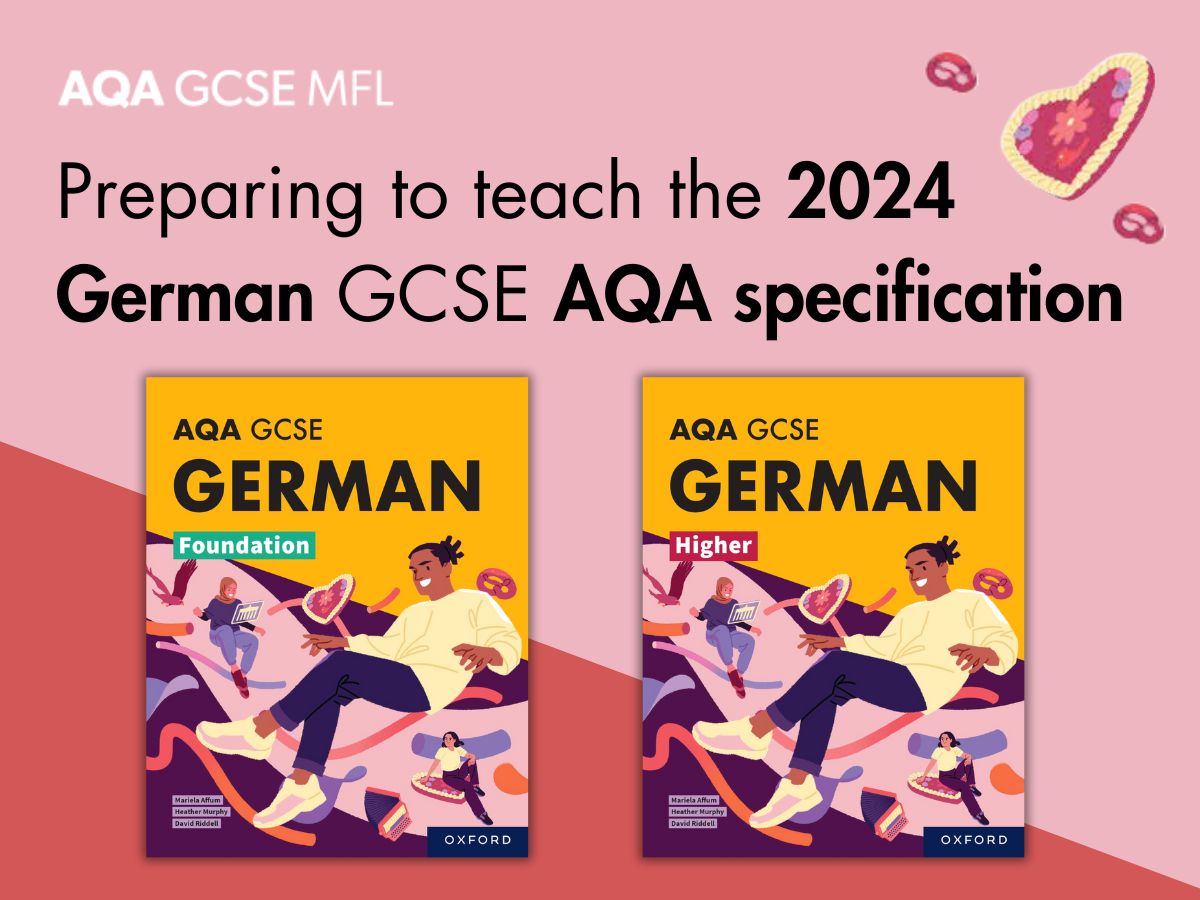By Mariela Affum, author and German teacher
I have over 18 years’ of teaching and examining experience and have seen several “new” specifications come and go. As teachers, we must constantly adapt to these changes and make sure that we provide the best possible preparation for our students, as their grades depend on our understanding of the exam and assessment criteria. This can be daunting at times, especially if you are new to this profession or have only just got to grips with the last specification!
Here, I’ll discuss some of the challenges that are always part of teaching German at GCSE, alongside what’s new in the German GCSE AQA specification (for first teaching from September 2024), and how the AQA GCSE German resources from Oxford University Press (Oxford) can help*.
What are the main differences between the current and new AQA GCSE German specification?
- Assessments: While the exams have changed slightly, I was positively surprised by the changes AQA has made. Firstly, because they are only minor tweaks in some instances and secondly, because the exam has, in many parts, become much more student friendly.
Within the speaking exam, students will be relieved to learn that the role play is much more straight forward, with clear instructions in English. The new Student Books from Oxford reflect these changes, with plenty of opportunity to practise speaking for the new types of assessment, such as the reading aloud task, making them an invaluable tool for in-classroom assessment practise.
Another rather big change can be seen in the listening exam, where students will be required to complete a dictation/transcription exercise. It will be necessary for students to be confident in their phonics skills to successfully prepare for these tasks. In an ideal world, key phonics skills would have been comprehensively covered at Key Stage 3 (see Oxford’s KS3 German Echt course, for example). However, the AQA GCSE German Student Books from Oxford recap phonics throughout, to reinforce learning from KS3 and deepen their understanding with a variety of transcription tasks covering all key themes and topics.
As for the writing exam, the directional bullet points are now provided in English. This will benefit many students enormously as they’re able to understand the instructions clearly, preventing any misunderstandings that can ultimately result in marks being missed. Each unit of Oxford’s AQA GCSE German Student Books offer a ‘Test and revise’ section based on this new exam layout. In addition, at the end of the book there is an assessment section covering a mixture of topics in all four skills, with exam tips for the different skills and question styles. - Vocabulary and Topics: There has been many changes to the new AQA vocabulary lists, with many words added and some words, such as “Bildschirm”, “obdachlos” or “reiten”, and many food items disappearing from the list. For this reason, it is invaluable to have a book with vocabulary pages which are almost entirely based on the AQA list. Oxford’s AQA German resources for the 2024 GCSE do exactly that, while also clearly highlighting words that are not featured on the list, to avoid any confusion. Furthermore, there has also been an interesting shift in topics: “Celebrity Culture” has been introduced for the first time, and “Social Issues” does not appear as such anymore.
“I was positively surprised by the changes AQA has made…because the exam has, in many parts, become much more student friendly.”
How can you teach Foundation and Higher students together?
- Facilitating co-teaching: Every year, when we receive our timetables and class lists combined with data about our students, we are faced with the challenge that there can be vast discrepancies in previous knowledge, even within set classes. We then have two years to try and close the gap that has been growing for three years, alongside supporting any new starters joining the class mid-term.
So, how can we effectively get our students aligned and up to speed? Fortunately, Oxford’s AQA GCSE German Student Books (available in Foundation and Higher tiers) offer an excellent starting point to upskill students. Shared spreads on each topic at core level, and one at higher and foundation level helps to facilitate co-teaching and introduce core topic vocabulary, including vocabulary students should have learned in Key Stage 3.
How do you keep students interested in learning German at GCSE?
- Fresh and engaging content: Although we hope that students at Key Stage 4 have chosen this subject and have some interest in it, this is not always a given. On the other hand, even a keen student can become disinterested if the lesson content is too dull.
Not only are Oxford’s AQA GCSE German Student Books positively fresh and engaging, but they are carefully matched to the new German GCSE AQA specification. You will find interesting and surprising culture spreads for each theme throughout, helping to foster students’ interest in target-language societies. A particular highlight includes the magazine-style culture pages which cover topics such as multilingual stars (who have been carefully selected to stand the test of time), and Alpine lifestyle, which are both great topics of conversation and inspiring research starters that help to incite curiosity and excitement among learners
- Speaking confidence: For me, one of the most important things in the classroom is to get my students talking. Yes, I would love them all to achieve high grades in their final exam, but I also make it very clear that languages are all about communication and that sometimes, communication works even while we struggle with grammar and vocabulary.
Regular speaking activities – whether in pairs, groups or as a whole class – should never be overlooked. All too often we feel pressured to provide lots of written work in students’ books, however, a lesson of engaged and focused speaking and listening tasks among peers is extremely valuable.
How can you help your students get to grips with grammar?
- Explicit and implicit: All grammatical features AQA require for their top grades are explained in a student-friendly way in Oxford’s Foundation and Higher tier Student Books, and both come with plenty of grammar activities. They are also featured in the Reading and Listening extracts and are regularly recycled throughout the course to help students become accustomed to integrating certain clauses, connectives, and tenses.
- Tenses: As in the previous specification, tenses are still central to achieving the top marks. While students should have been exposed to present, perfect and future tense in Key Stage 3, the AQA GCSE German Student Book introduces all tenses from scratch – which is again helpful when teaching mixed-ability classes. Tenses are then revisited throughout the course so that students get multiple opportunities to perfect their understanding and use of them.
In my classroom, it is a common starter activity to form tenses of a verb of my choice. I recommend students write tenses of a verb they feel familiar with on the back of their writing paper before they start, so that they can refer back to it in case they get confused in the middle of the exam due to nerves.
What is available to help you teach the new AQA GCSE German specification?
- Interactive learning: I had been teaching for several years before looking at the teacher notes and solutions on Kerboodle and then immediately felt like a fool for making my life unnecessarily difficult at times. I would encourage any teacher – even with a lot of experience – to look at Oxford’s Teacher’s Notes and Solutions on Kerboodle, as it provides so much more than just answers. Answers to writing or speaking tasks can even make useful material to be discuss in class. Audio transcripts can be adapted and used in class for additional activities. Part of me likes to make my own resources, but we must use our time wisely and make the most of existing material already on offer. Oxford’s interactive digital resources on its online learning platform, Kerboodle, offers a great source of extra practise for students and provides lots of useful additional resources and content.
And finally…
To conclude, a lot of what we have done up to now as German teachers is still helpful and relevant for the new AQA GCSE German specification, we just need to ensure that we practise the exam skills as they will appear in the new exam.
The new AQA GCSE German Student Books are designed exactly for this purpose, and to alleviate the workload of teachers who might feel the need to create their own resources to reflect the changes in the exam.
Best of luck!
You can access sample chapters from the new German Student Books from Oxford by signing-up here, if you haven’t already, and the books are available to pre-order now in time for publication early 2024.
AQA GCSE German resources are matched to the new AQA GCSE German specification* for first teaching from September 2024, and are available from Oxford University Press.
* Oxford’s Student Books and Kerboodle Books have been entered into an approval process with AQA.
Click to view our author blogs about implementing the new AQA GCSE French and AQA GCSE Spanish 2024 specifications.

Mariela Affum is a German teacher and writer born in Germany. She authored Oxford’s KS3 Echt series and currently teaches at a high school in London. She studied German, Spanish and English philology at Albert Ludwigs University of Freiburg, moving to England in 2005 to complete her teacher training at Goldsmiths University. She currently teaches at Claremont High School, London

